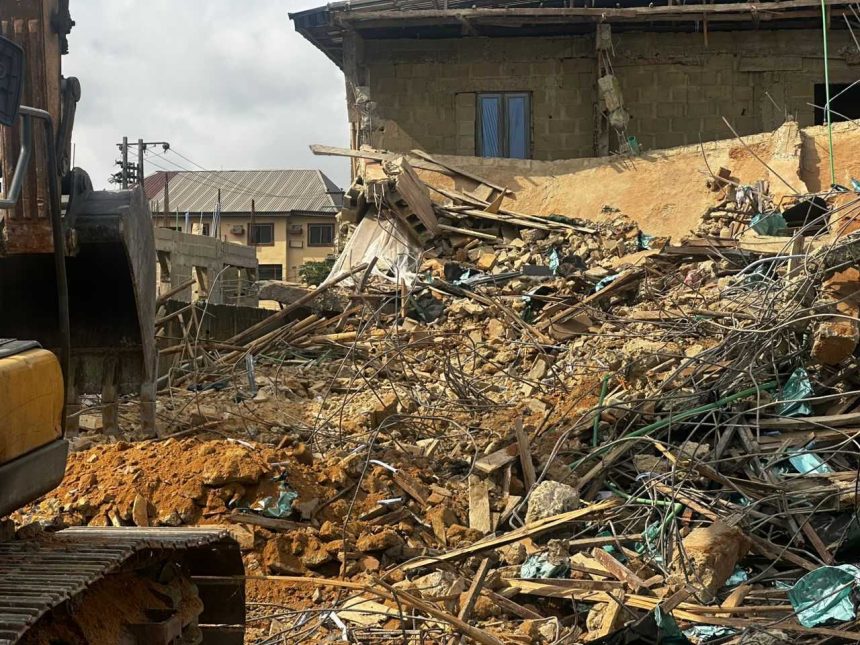For over two decades, Nigeria has had a law designed to protect lives and investments from the devastation of building collapses. Yet, in most parts of the country, it remains ignored. The Compulsory Building Insurance Law, meant to ensure compensation for victims and property owners, has only been enforced in Lagos and Ogun states. Across the other 34 states, compliance is virtually nonexistent.
The consequences are tragic. Buildings keep collapsing, lives are lost, businesses crumble, and families are left without homes. Developers cut corners, ignoring safety regulations. Many homeowners assume disaster won’t happen to them, while authorities fail to hold anyone accountable.
Under Nigeria’s 2003 Insurance Act (Cap 117), any building used for residential, commercial, educational, or medical purposes must have insurance coverage. This includes protection against collapse, fire, floods, earthquakes, vandalism, theft, and third-party damage. The goal is simple: when a building fails, victims should receive financial compensation, and property owners should have the means to rebuild.
But in reality, most people don’t comply. A survey by Housingtvafrica found that only two out of every ten property owners bother to insure their buildings. The reasons? Some believe “God will protect them,” while others either don’t know the law exists or simply don’t trust insurance companies. Many assume that even if they pay for coverage, they will never receive a payout when disaster strikes.

And yet, compliance is incredibly affordable. The compulsory insurance costs just ₦5,000 per plot and per floor. A two-story building on one plot costs around ₦15,000, while the same structure on two plots is ₦20,000. Developers constructing buildings over two floors are required to secure coverage or face a fine of ₦250,000—or even three years in prison.
Still, enforcement is weak.
The Numbers Don’t Lie
In the past 50 years, Nigeria has recorded at least 629 building collapses, resulting in over 1,578 deaths. Lagos accounts for more than half of these cases, with 326 recorded incidents. Other high-risk states include Anambra, Oyo, Kano, Delta, and the FCT. Meanwhile, states like Gombe, Bayelsa, Taraba, and Katsina have seen the fewest cases.
A recent tragedy underscores the crisis. At Oriwu Estate near Lekki-Epe Expressway, a three-story building under construction collapsed, killing four people and injuring several others. None of the victims had insurance coverage. The owner? Left to deal with the financial losses alone.
The pattern is all too familiar. Injured workers are abandoned. Families of the deceased receive no compensation. Neighbors suffer damage to their properties with no recourse for repairs. And the developers responsible? Many simply move on to the next project, escaping any real consequences.
The Real Cost of Non-Compliance
For property owners, the lack of insurance leads to financial ruin. If a building collapses, they are forced to shoulder reconstruction costs alone. When damages extend to nearby buildings, neighbors must pay for repairs out of pocket. If the owner faces lawsuits, legal fees can run into millions of naira. Without insurance, these losses can be impossible to recover from.
Despite these risks, compliance remains dismal—even in Lagos, where the law is integrated into the Urban and Regional Planning and Development Act. Property owners are required to submit proof of insurance to the Lagos State Building Control Agency (LASBCA), but enforcement has been weak.
Ogun State has also mandated compulsory insurance through its 2022 Building Production Management Authority Regulation. Developers must obtain an All-Risk Insurance Policy for any structure over two floors. This policy covers losses from construction failures, worker injuries, and third-party damage. Yet, like in Lagos, enforcement remains largely ineffective.
Why Nigerians Still Ignore the Law
Experts point to several factors fueling non-compliance:
-
Weak Enforcement: State agencies lack the manpower or commitment to enforce the law effectively.
-
Lack of Awareness: Many developers and property owners don’t even know insurance is mandatory.
-
Mistrust in Insurance Companies: Many believe insurers will take their money but refuse to pay when disaster strikes.
-
Cost-Cutting by Developers: Some developers deliberately avoid insurance to save money, even if it puts workers and tenants at risk.
Lola Olawore, an insurance expert at Staco Insurance Plc, believes the only solution is stronger enforcement. “Most Nigerians don’t take insurance seriously unless they are forced to. Look at Third-Party Vehicle Insurance—compliance only increased when the authorities cracked down on violators.”
The National Insurance Commission (NAICOM) has acknowledged the issue. CEO Olusegun Omosehin recently revealed plans to increase Nigeria’s insurance penetration to 5% in the coming years. But for now, most Nigerians still view insurance as unnecessary.
Samson Opaluwah, Chairman of the Council of Registered Builders of Nigeria (CORBON), warns that unless the Contractor All-Risk (CAR) Insurance policy is strictly enforced, the cycle of disaster will continue. “This policy exists to protect buildings and workers on-site. But because enforcement is so weak, most contractors ignore it entirely.”
What Needs to Change?
The solution is simple: strict enforcement, public education, and severe penalties for violators.
The government must:
-
Mandate proof of insurance before construction permits are issued.
-
Conduct regular inspections to ensure compliance.
-
Apply heavy fines and penalties on developers who fail to comply.
-
Educate property owners on the importance of insurance coverage.
Until these measures are taken seriously, more buildings will collapse. More lives will be lost. More investments will be destroyed.
For now, the cycle continues. Developers ignore the law. Authorities fail to act. And when disaster strikes, it’s the victims who pay the ultimate price. Unless something changes, the next tragedy is only a matter of time.



